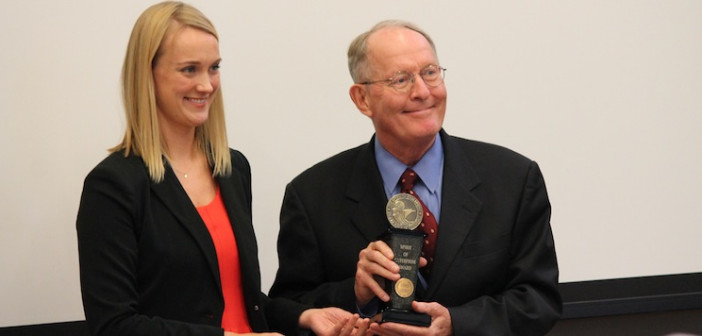By Sarah Colson
Senator Lamar Alexander visited the General Shale Conference Center at ETSU’s Natural History Museum in Gray Sept. 2 to receive the U.S. Chamber’s Spirit of Enterprise Award and update those present on what he’s been doing in Congress for the past year, namely looking out for small business and emphasizing the importance of higher education at an affordable rate.
The Spirit of Commerce Award was given to 32 members of the Senate who exhibited support of pro-growth and pro-job policies. Such policies included those intended to “reopen the federal government and raise the national debt ceiling, reform the nation’s broken immigration system, and issues dealing with trade, transportation, legal reform, and the budget.” Recipients must support the Chamber’s position on at least 70 percent of votes relating to critical business legislation.
“Last year in the second session of the 113th congress, just 14 votes of the many votes out on the floor were considered to be key votes considered in the spirit of enterprise rankings,” U.S. Chamber of Commerce representative, Pamela Gregory, said. “I am proud to tell you that your Senator Alexander scored 100 percent.”
Alexander, a seventh-generation Tennessean, is the only Tennessean popularly elected both governor and senator. In his campaign for governor, and to show his support of a healthier Tennessee, he walked 1,000 miles across the state. His efforts to improve state education have been evident in both his roles as former president for the University of Tennessee and the secretary of education as well as in the recent legislation he has worked to pass.
“We’ve done something Congress hasn’t been able to do in several years,” Alexander said, “that is to fix No Child Left Behind, both throughout the senate and the house. I believe in better teaching. I believe in higher standards. I believe in real accountability. And I believe the path to do that is not through Washington D.C., but through states and communities. So we can recruit for an industry, and so our citizens can get good jobs, we want to set those standards.”
He added that not only is East Tennessee a good region for educational opportunities, but that Johnson City in particular is well-situated for any kind of industry and manufacturing.
“You’re right smack dab in the center of the most competitive part of the American auto deal industry, which the Tri-Cities area is,” he said. “You have an excellent four-lane highway system, a good work force. You’re in pretty good shape for the future and it’s good to be here and to think about that with the Chamber of Commerce.”
Alexander went on to say that not only is the industrial side of Johnson City and the entire region of Northeast Tennessee exciting for business, but so are the opportunities for tourism, particularly in the national and state parks. He mentioned in particular, Rocky Fork State Park, which he was visiting after the luncheon.
“There’s not much there, one might say, except some of the most beautiful land you’ll ever see,” Alexander said. “It’s also a gateway to the Appalachian Trail. It’s not just the source of great enjoyment for the outdoors, but a source of jobs and income.”
Alexander also spent some time cautioning businesspeople of the Tri-Cities about the new legislation the National Labor Relations Board, which he described as a “runaway organization,” has passed recently regarding the status of small franchises and “micro-unions” within businesses.
“What the NLRB has done is taken away a strong incentive for major corporations in this country to allow franchise opportunities — 780,000 of them in the U.S.,” he said. “What that will mean is the big will get bigger, the small will get smaller, and there will be fewer examples of small business.”
Alexander added that the danger of micro-unions is that it makes organization and accountability a lot more complicated than it needs to be.
“Imagine if you’re an employer in a company and then there are dozens, maybe hundreds of individual unions that are that small,” he explained. “(This will) make it more difficult to create more jobs. So I’ve introduced legislation to try to change that. It would say that there would be an equal number of Republican and Democrat members of the NLRB. It would rein in the general council from being so active. It would encourage timely decision-making by saying that if the NLRB hasn’t decided a case in a year, you can go ahead to federal court.”
The Senator ended his speech with a tongue-in-cheek comment on what he called the “reality show presidential race” and assured the audience that he was not that kind of politician.
“I’m not a part of the reality show effort,” he said. “What I’m doing is trying to fix No Child Left Behind that affects 100,000 public schools and 50 million children. I’m trying to make it easier for college students to go to ETSU and our many colleges and technical institutes so that Governor Haslam’s Tennessee Promise program can realize its full promise. I get up every day hoping that I have the chance to make some kind of difference for the better in this state and most of the time when I go home to bed at night, I think that I have.”





